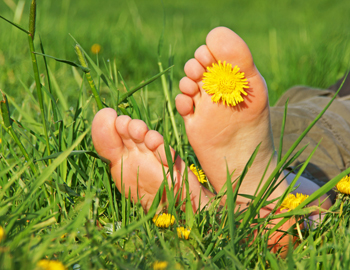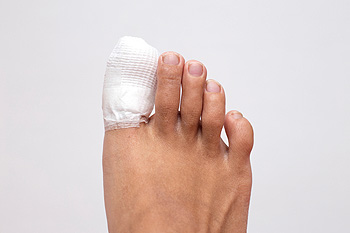 Just like most physical activities, there is a risk of a variety of foot and ankle injuries that can occur from playing soccer. While many are acute, overuse injuries can happen as well. One of the most common injuries (and re-injuries) that occurs is an ankle sprain. When the ankle rolls, the ligaments can become damaged or torn. Achilles tendonitis is another form of an overuse injury that causes pain and inflammation to the Achilles tendon in the back of the ankle. Metatarsal stress fractures are also a common overuse injury in soccer. A stress fracture is a hairline crack in the bones that causes gradual worsening pain. If you have been injured or notice moderate to severe pain or swelling, especially while walking, visiting a podiatrist for a proper diagnosis and treatment method is highly recommended.
Just like most physical activities, there is a risk of a variety of foot and ankle injuries that can occur from playing soccer. While many are acute, overuse injuries can happen as well. One of the most common injuries (and re-injuries) that occurs is an ankle sprain. When the ankle rolls, the ligaments can become damaged or torn. Achilles tendonitis is another form of an overuse injury that causes pain and inflammation to the Achilles tendon in the back of the ankle. Metatarsal stress fractures are also a common overuse injury in soccer. A stress fracture is a hairline crack in the bones that causes gradual worsening pain. If you have been injured or notice moderate to severe pain or swelling, especially while walking, visiting a podiatrist for a proper diagnosis and treatment method is highly recommended.
Sports related foot and ankle injuries require proper treatment before players can go back to their regular routines. For more information, contact one of our podiatrists of Foot Health Center of Merrimack Valley. Our doctors can provide the care you need to keep you pain-free and on your feet.
Sports Related Foot and Ankle Injuries
Foot and ankle injuries are a common occurrence when it comes to athletes of any sport. While many athletes dismiss the initial aches and pains, the truth is that ignoring potential foot and ankle injuries can lead to serious problems. As athletes continue to place pressure and strain the area further, a mild injury can turn into something as serious as a rupture and may lead to a permanent disability. There are many factors that contribute to sports related foot and ankle injuries, which include failure to warm up properly, not providing support or wearing bad footwear. Common injuries and conditions athletes face, including:
- Plantar Fasciitis
- Plantar Fasciosis
- Achilles Tendinitis
- Achilles Tendon Rupture
- Ankle Sprains
Sports related injuries are commonly treated using the RICE method. This includes rest, applying ice to the injured area, compression and elevating the ankle. More serious sprains and injuries may require surgery, which could include arthroscopic and reconstructive surgery. Rehabilitation and therapy may also be required in order to get any recovering athlete to become fully functional again. Any unusual aches and pains an athlete sustains must be evaluated by a licensed, reputable medical professional.
If you have any questions please feel free to contact one of our offices located in North Andover, and Tewksbury, MA . We offer the newest diagnostic and treatment technologies for all your foot and ankle needs.














